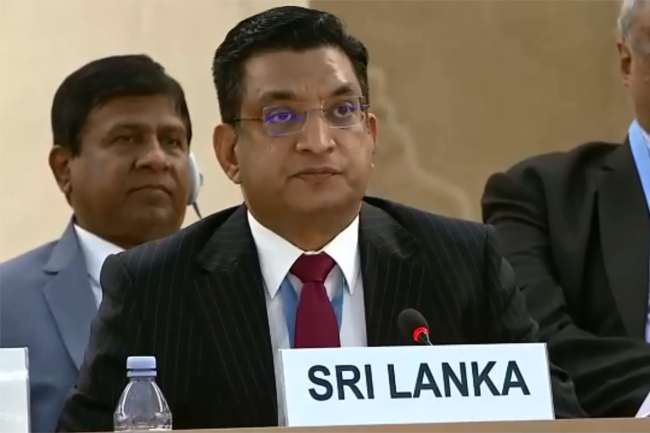Foreign Minister Ali Sabry has reiterated that a handful of persons who advised President Gotabaya Rajapaksa caused the unprecedented economic meltdown.
Sabry has alleged that politicians, officials, public sector as well as the trade unions are responsible for the crisis.
The Minister said so in response to ‘Hiru’ anchor Chamuditha Samarawickrema seeking an explanation regarding the Geneva-based United Nations Human Rights Council (UNHRC) taking up the contentious issue of economic crimes in Sri Lanka.
In a wide-ranging interview on ‘Salakuna’ on Monday (10), Sabry repeated the accusations that he had made in June in his capacity as the Finance Minister following talks with the International Monetary Fund (IMF) in Washington.
However, Minister Sabry declined to call those responsible ‘economic assassins’ or categorise their actions ‘economic crimes.’ But he acknowledged that as a member of the Cabinet-of-Ministers he had also been named a respondent in Court cases in this regard.
Sabry stressed that he didn’t believe that those who had been blamed for the crisis did so purposely though the then President Gotabaya Rajapaksa acted recklessly, on advice received, without taking sufficient safeguards.
The Bar Association of Sri Lanka (BASL) is among the parties to move the apex court over the unprecedented financial meltdown.
The panel of interviewers, comprising Chamuditha Samarawickrema, Madushan de Silva and Kalindu Vithanage, repeatedly pointed out that the denial of basic requirements could be considered violation of human rights.
When the panel pointed out that Minister Sabry essentially agreed with the views expressed by the international community, and other interested parties, as regards economic crimes, the lawmaker said that in spite of the deteriorating crisis, still those responsible continued to make promises, at the expense of economic stability. Minister Sabry cited the recent declaration of free mid-day meal as a case in point. Such promises were made without making required financial provisions, the Minister added.
Minister Sabry said that he wouldn’t under any circumstances,defend the indefensible and alleged that the country wouldn’t have been in this mess if not for arrogant conduct of the decision-makers.
Sabry compared how Dr. Indrajith Coomaraswamy in his capacity as the Governor of the Central Bank (June 2016-Dec. 2019) had successfully handled an impending crisis due to the response of those at the helm following the last presidential election, in Nov. 2019 before it developed into a catastrophe.
The Minister said that as the former Finance Minister he took the responsibility for the declaration of default status by Central Bank Governor Dr. Nandalal Weerasinghe in the second week of April this year. Emphasising that there was absolutely no uncertainty regarding that decision taken, Minister Sabry said that in addition to the Finance Secretary, Mahinda Siriwardana, and Dr. Weerasinghe, the government had consulted a three-member committee of economic and fiscal experts of the Presidential Advisory Group, Dr. Indrajith Coomaraswamy, Prof. Shanta Devarajan and Dr. Shamini Cooray.
Minister Sabry cited the Ceylon Electricity Board (CEB) as one of the enterprises that had contributed to the deterioration of the national economy. He explained how the CEB engineers brazenly thwarted attempts to enhance renewable energy capacity on various pretexts. Calling them a Mafia organization, Minister Sabry pointed out how those who had blocked renewable energy projects, approved emergency power purchases, at exorbitant rates. Chamuditha Samarawickrema pointed out that there was no point in making such allegations. The Hiru team stressed the responsibility on the part of the government to address the issue at hand.
Commenting on the latest defeat, suffered by Sri Lanka at the UNHRC, Minister Sabry said that the country was paying a very heavy price for failing to fulfill the promises made by successive governments before the international community.
Declaring that Sri Lanka couldn’t accept hybrid courts to examine accountability issues, Minister Sabry decried the co-sponsorship of the Geneva resolution, in Oct 2015, during the Yahapalana administration. Responding to criticism that only seven countries voted, objecting the resolution moved against Sri Lanka, Minister Sabry said that of the 20 countries that voted against Sri Lanka, many represented the EU. Minister Sabry said that the proponents of the resolution believed they could secure more than 24 votes though ended up with 20.
Sabry reiterated their commitment to do away with the Prevention of Terrorism Act (PTA) perhaps before end of this year to pave the way for a new law, in line with international standards.
Minister Sabry emphasised that the contentious issues of reconciliation and accountability should be addressed with appropriate mechanisms. Success of such projects depend largely on workable mechanisms, not individuals.


